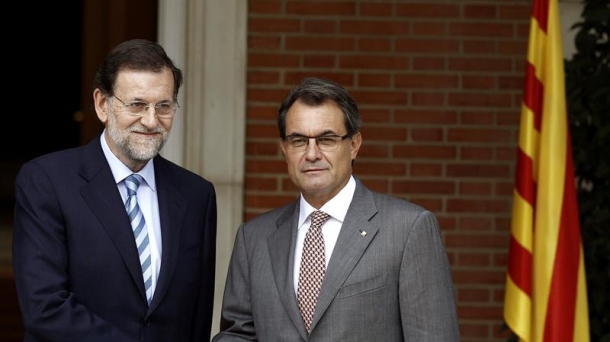Politics
Financial crisis
Mas meets Rajoy to discuss proposals for Catalonian own tax regime
Reuters
Madrid
An upsurge in Catalan pro-independence feelings is founded on a conviction that Madrid is draining the region financially.
-

Catalan President Artur Mas and Spanish PM Mariano Rajoy at a previous meeting. Photo: EFE
Spain's economic crisis is exposing deep regional fault lines. Among Catalans on Barcelona's boulevards the talk is of independence, and Madrid is worried.
This week the king and prime minister called for national unity to get Spain through its worst downturn in decades, King Juan Carlos recalling the spirit that built a democracy after dictator Francisco Franco's death in 1975.
Popular momentum for independence has never been stronger in Catalonia, a wealthy region in northeastern Spain that generates one fifth of the country's economic output and is home to 16 percent of Spaniards.
More than half of Catalans say they want a separate state, and hundreds of thousands marched in Barcelona last week – the biggest such show of separatist fervour.
Still, few see a rapid road to an independent Catalonia, a dream rooted in the Middle Ages when Barcelona was a Mediterranean trade centre with a parliament. "It's going to be a difficult and long process ... For us to get it they would have to have a referendum, and they're not going to give us that," said Jose Maria Prats, a nurse who joined the march.
The upsurge in Catalan separatism is founded on a conviction that Madrid is draining the region financially.
The central government collects most taxation payments then redistributes them to Spain's 17 self-governing regions, which run their own schools and hospitals. Each year Catalans say they pay 16 billion euros more in taxes than the regional government spends.
"The crisis has shown that Spain's regional financing model does not work. There is no doubt we need to advance towards a federal system of taxation," said Jose Ignacio Conde-Ruiz, deputy head of think-tank FEDEA.
The flare-up in Catalonia has come at a difficult time for Prime Minister Mariano Rajoy who is struggling to bring Spain's deficit under control and resisting following Greece, Ireland and Portugal into an international bailout.
He has threatened to intervene in regions that cannot control their budgets. Catalonia is likely to miss its deficit target this year and has had to ask Madrid for a 5 billion euro bailout to meet its debt redemptions.
Differences run deep
With an economy about the size of Portugal's, Catalonia houses global firms including toll road, telecoms and airport operator Abertis and healthcare group Grifols.
Children are schooled in Catalan and Spanish is treated as a foreign language in the home region of Joan Miro, Salvador Dali and Antoni Gaudi. Catalans banned bullfighting in a 2010 referendum highlighting their difference from the rest of Spain.
Such proud expressions of regional identity were suppressed during Franco's rule from 1939-1975, and the regions only won significant autonomy under the 1978 constitution that marked the country's return to democracy.
Catalan President Artur Mas, of the conservative Convergence and Union, or CiU, up until last week an advocate of autonomy but not of independence, has fallen into line with public opinion. He says he will work toward a referendum like the one Scotland may hold in 2014 on breaking its 305-year union with England.
"We went one way for 30 years and now there's a change in direction ... Catalonia needs instruments of state," he told Madrid's political and business elite at a forum last week.
In Madrid, economists scoff at the Catalan argument that they contribute more in taxes, saying any wealthy region of any country could say the same. Economists in Catalonia say the gap between the money flowing to Madrid and the money flowing back to the region is wider than in Scotland.
Even if it had to pay for its own military and diplomatic corps, the financial benefit to Catalonia would be equivalent to seven percent of its GDP, says Elisenda Paluzie, dean of the economics and business school at the University of Barcelona.
Mas and Rajoy are scheduled to meet on Thursday to discuss Mas's proposals to free Catalonia from the common tax regime.
Secession would complicate Catalonia's relationship with Europe. The European Union says an independent Catalonia seceded it would have to reapply for membership of the bloc.
top stories



-
news
New anti-eviction law
Andalucia begins proceedings to seize confiscated houses from banks
-
news
London attack
British police ponder conspiracy after soldier murder
-
Sport
Giro d'Italia
Nibali tightens grip on overall lead after stage victory
© EITB - 2024 - Privacy Policy - Legal disclaimer - Cookie Policy - Cookie settings


